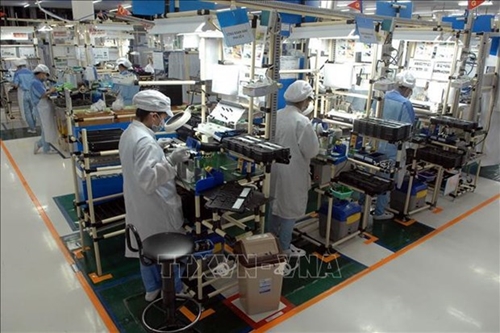In terms of economic recovery and stable development, the author cited the "The World in 2050" study by PwC consulting firm, which predicted that Vietnam will have the second highest annual GDP-growth rate worldwide.
    |
 |
|
At a Japanese-invested manufacturing assembly in Hanoi |
There will be an average growth by 5.3% each year, from 2014 till 2050. That means Vietnam will have the fastest growing economy within Asia till 2050. In addition, the inflation rate is controlled by the Government with consumer price index to be in the range of 3% - 5% for the whole year, which is far below the maximum allowed inflation rate of 4.5% in 2023. These two important macroeconomic indices have proved the Government's success to a certain extent in recovering and maintaining stable development of the economy, he said.
According to the article, the Vietnamese Government is fiercely improving the business and investment environment and making great attempts to achieve key economic indicators of top regional countries. For that reason, Vietnam encourages FDI on projects that utilize advanced, emerging, high, or clean technology, modern management methods, and contribute positively to global production and supply chains.
Until now, Vietnam has negotiated, signed and put into effect a number of bilateral and multi-lateral free trade agreements (FTAs) with almost all the big economies in the world. Of the figure, 16 FTAs involving more than 60 partners have become effective, covering all continents with a combined GDP accounting for nearly 90 percent of global GDP. Looking at the liberalization level of market access under the World Trade Organization (WTO), Vietnam is on par with Singapore - the most developed country in the Southeast Asia.
Vietnam has concluded an FTA with the European Union and joined the Comprehensive and Progressive Agreement for Trans-Pacific Partnership (CPTPP). Thus, from an international trading and investment perspective, Vietnam is unmatched when it comes to partnership and openness of market access.
The article pointed out that the new laws considered the most liberal and investor-friendly in the region, such as the Enterprise Law, Investment Law and Public Private Partnership Law, have been adopted. Barriers to business and investment are removed to pave the way for an open, transparent and full-of-opportunity environment for foreign investors.
In an attempt to ease burdens on investors, the Government issued a Decree in 2015 to provide more flexibilities in foreign ownership ratio in public listed companies, up to 100% in certain cases, and allow foreign investors to make unlimited investment in Government bonds, bonds guaranteed by the Government, bonds of the provincial authorities or enterprises.
Concluding the article, the author said Vietnam is a country of changes and currently offering increasing opportunities for foreign businesses. The underlying strength of the economy is reflected in, among others, controlled macroeconomic indicators, strong productivity gains and extensive integration into regional and global economy. It is now exactly time for foreign investors to start their business plans and grasp the upcoming clear opportunities.
Source: VNA